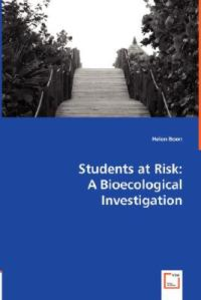Students at Risk: a bioecological investigation
Boon, Helen (2008) Students at Risk: a bioecological investigation. Verlag Dr. Muller, Saarbrücken, Germany.
![[img]](https://researchonline.jcu.edu.au/2062/1.hassmallThumbnailVersion/2062_Boon_2008_cover.jpg)
|
Image (JPEG) (Front Cover)
- Cover Image
Download (8kB) |
|
|
PDF (Front Pages)
- Supplemental Material
Download (2MB) |
Abstract
This comparison study examines how socio-economic, parental and school perceptions relate to the motivation, coping strategies and academic achievement of students at risk of dropping out of school. The aim of the study was to compare and contrast students at-risk with typical and resilient students to derive a profile of an academically resilient student. Bronfenbrenner’s theory of development underpinned the study. It postulates that: a) human development and socialisation is context-dependent; b) parenting and school influences have an impact upon adolescent outcomes; c) socioeconomic factors and school environments affect development via socialising and psychological processes; d) parenting processes, which predict both academic achievement and psychological adjustment are moderated by socio-economic and family structure variables; and e) congruence perceived in two contexts strengthens adolescent outcomes. The sample comprised 1127 students from Years 8 to 10 attending three North Queensland urban state high schools. The control and at-risk groups were selected according to their English and mathematics grades; the resilient group was extracted from typically achieving students based on their parents’ employment and educational level. Since 10 per cent of the students identified themselves as Indigenous analyses were also conducted to compare Indigenous with non- Indigenous students. A mixed methods approach was taken. A survey instrument was analysed first followed, some months later, by interviews with students selected from the three groups to triangulate and augment results. Comparisons of the three groups of students yielded significant differences. Students at-risk reported significantly higher levels of neglectful parenting, higher suspension levels, and blended or single-parent family structures where both parents had an education limited to high school level and at least one parent was unemployed. Moreover, being Indigenous was significantly linked to being at-risk. Indigenous students were as likely to be at-risk in Year 8 as in Year 9, with the proportion of at-risk students doubling in Year 10. By contrast, non-Indigenous students were statistically more likely to be at-risk in Year 10. Students at-risk had the lowest levels of self-efficacy, mastery goals and positive coping strategies, and highest levels of projective coping and self-handicapping. Their school ratings, based on their appraisal of teacher relationships, curriculum and feeling happy about being at school were also the lowest. An important finding, however, was that all of these variables were significantly raised to the levels of typical students in those students at-risk whose parenting was authoritative, as indicated by high levels of warmth and involvement and supervision. This showed the importance of parenting in predicting motivations, coping and school perceptions. By contrast, resilient students, whose socio-demographic characteristics were the same as those of students at-risk, reported parenting characterised by high levels of monitoring, comparable to typical students, though the warmth and involvement dimension of their parenting was low. They also reported a high proportion of neglectful parenting. Resilient students’ levels of self-efficacy, mastery goals and positive coping were as high as typical students’, while their levels of self handicapping and projective coping were low. Unlike students at-risk, their ratings of teacher relationships and the curriculum were high. Once again, in contexts characterised by high parenting ratings, higher mean scores for school perceptions, self-efficacy, mastery and positive coping and lower projective coping and self-handicapping scores were reported. For Indigenous students, a high suspension level, paternal unemployment, a blended or single parent family and non-graduate maternal education significantly predicted at-risk status. When contrasted to non-Indigenous students, Indigenous students had significantly higher levels of neglectful parenting than non-Indigenous students, possibly due to the higher proportion of blended families within the group. Indigenous students reported significantly higher self-handicapping, lower self-efficacy and lower positive coping strategies. An unexpected finding was that there were no differences between Indigenous and non-Indigenous students’ in their views of school. Structural equation modelling showed that school views were highly positively correlated to parenting reports in typical students, but this was not the case for either resilient or students at-risk. The qualitative phase of the research, the six case studies, augmented and illustrated the statistical results and brought forth additional issues pertinent to the at-risk trajectory. In conclusion, parenting can act as a valuable protective factor facilitating students’ academic outcomes. At the same time, school processes can help foster resilience in students placed at-risk through structural and SES factors. This might be accomplished by encouraging a mastery goal orientation and positive coping strategies, which in turn are positively related to academic self-efficacy and low levels of suspension. Teacher relationships in particular are potential protective factors for students at-risk.
| Item ID: | 2062 |
|---|---|
| Item Type: | Book (Scholarly Work) |
| ISBN: | 978-3-8364-8645-3 |
| Keywords: | at risk; resilient student; motivation; parenting style; school perceptions; structural equation modelling; achievement goals; secondary students; Indigenous students |
| Related URLs: | |
| Date Deposited: | 02 Nov 2009 04:48 |
| FoR Codes: | 17 PSYCHOLOGY AND COGNITIVE SCIENCES > 1701 Psychology > 170110 Psychological Methodology, Design and Analysis @ 40% 17 PSYCHOLOGY AND COGNITIVE SCIENCES > 1701 Psychology > 170103 Educational Psychology @ 40% 17 PSYCHOLOGY AND COGNITIVE SCIENCES > 1701 Psychology > 170113 Social and Community Psychology @ 20% |
| Downloads: |
Total: 20976 Last 12 Months: 16 |
| More Statistics |



